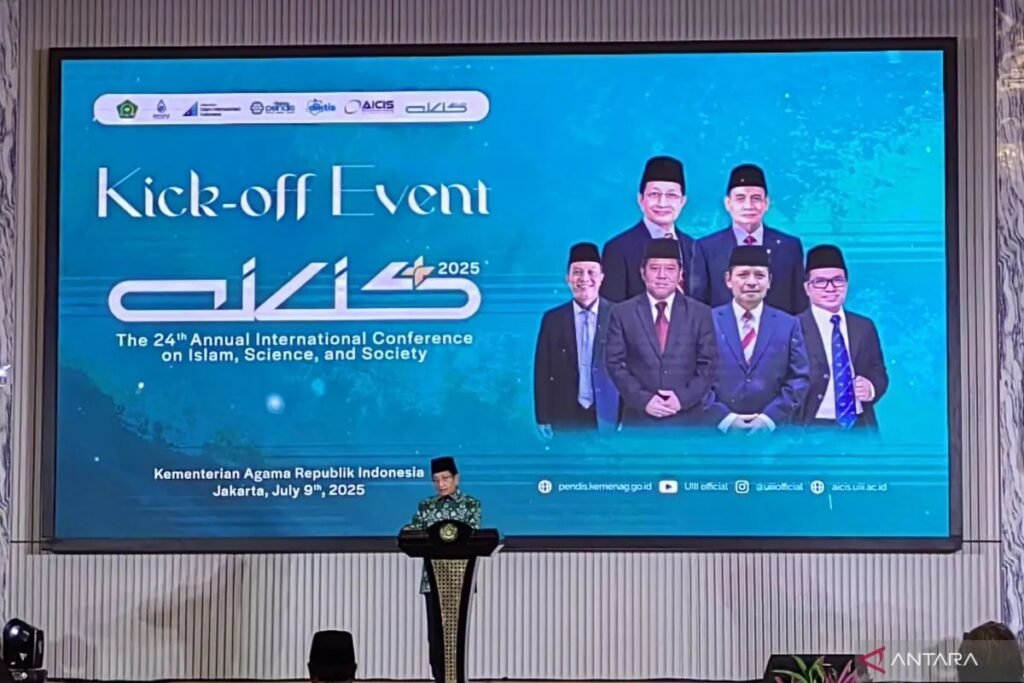
By Ahmad Syarief Amrullah, Co-Founder, Islamic World Development Network (IWDN)
The recent statement by Indonesia’s Minister of Religious Affairs, Prof. Nasaruddin Umar, claiming that Indonesia could become the birthplace of a new Islamic civilization has sparked renewed debate on the country’s place in the global Muslim world. Speaking during the announcement of AICIS 2025, the Minister envisioned Indonesia as the epicenter of a new Islamic awakening — a lofty aspiration that invites both hope and scrutiny. Historically, Islamic civilization has undergone multiple transformations, with its centers of intellectual and political power shifting from Baghdad and Cairo to Andalusia, Istanbul, and beyond. Each era of civilizational greatness was characterized by dynamic intellectual synthesis, scientific innovation, institutional sophistication, and a commitment to justice and inclusive governance. To claim that Indonesia is now poised to carry this mantle is not without symbolic value — but does the country truly meet the prerequisites?
Undeniably, Indonesia possesses significant social and demographic capital. It is home to the world’s largest Muslim population and boasts a rich religious tradition rooted in pluralism and moderation. The pesantren system, the coexistence of diverse Islamic schools of thought, and the evolving discourse of “Islam Nusantara” — which emphasizes local wisdom, tolerance, and peaceful coexistence — are all vital cultural assets. These have earned Indonesia praise as a potential counter-narrative to extremism in the Muslim world. Yet, a civilization is not built on numbers or slogans alone. The core question is whether Indonesia has developed the intellectual infrastructure, educational excellence, moral leadership, and technological innovation necessary to be recognized as a true civilizational force in the 21st century. Civilizations are not proclaimed — they are constructed, often painfully and over time, through sustained cultural investment, visionary policymaking, and institutional integrity.
There are still considerable internal challenges that hinder Indonesia from claiming such a role. Persistent religious intolerance, widening socio-economic inequality, and structural corruption pose fundamental threats to the moral and institutional foundations needed for a civilizational project. A society cannot aspire to lead the global Islamic renaissance while grappling with local injustices and democratic backsliding. Furthermore, Indonesia’s contribution to global Islamic discourse remains underdeveloped. Where is Indonesia’s equivalent of the great institutions of learning that once drove Baghdad, Cordoba, or Cairo? Where are its influential thinkers, its cutting-edge Islamic scholarship, its credible global journals and think tanks that can shape the future of Muslim societies? A civilizational claim must be backed by epistemic authority — a capacity to produce and disseminate knowledge that shapes norms, policy, and transnational consensus.
This is where Indonesia must shift its focus: from symbolic declarations to systemic development. It must invest significantly in Islamic higher education, foster transnational research collaborations, and cultivate platforms that connect Muslim-majority societies in Africa, Asia, and the Middle East in constructive dialogue and innovation. Institutions such as the Islamic World Development Network (IWDN) have begun to map these global Muslim potentials, offering strategic frameworks for development cooperation, intellectual exchange, and economic diplomacy among Islamic nations. Indonesia’s claim to civilizational leadership must also reflect its commitment to universal values — justice, sustainability, inclusion, and human dignity — in a way that resonates globally. In doing so, Indonesia would not only serve Muslims but also project a model of ethical leadership rooted in Islamic values for all humanity.
The future of Islamic civilization will not be defined by one country alone. It will be shaped by networks of cooperation, centers of excellence, and visionary leadership across the Global South. If Indonesia seeks to play a central role, it must commit to building bridges — between tradition and modernity, between Islam and science, between local wisdom and global challenges. Therefore, the proposition that Indonesia is the new epicenter of Islam should not be dismissed, but it must be approached as an agenda for action, not a title to be claimed. This is a moment for introspection — a call to accelerate reforms, deepen knowledge production, and elevate the ethical standards of governance and development. Only then can Indonesia truly stand not only as the world’s largest Muslim-majority nation, but as a civilizational beacon that uplifts and unites the Muslim world toward a shared future.